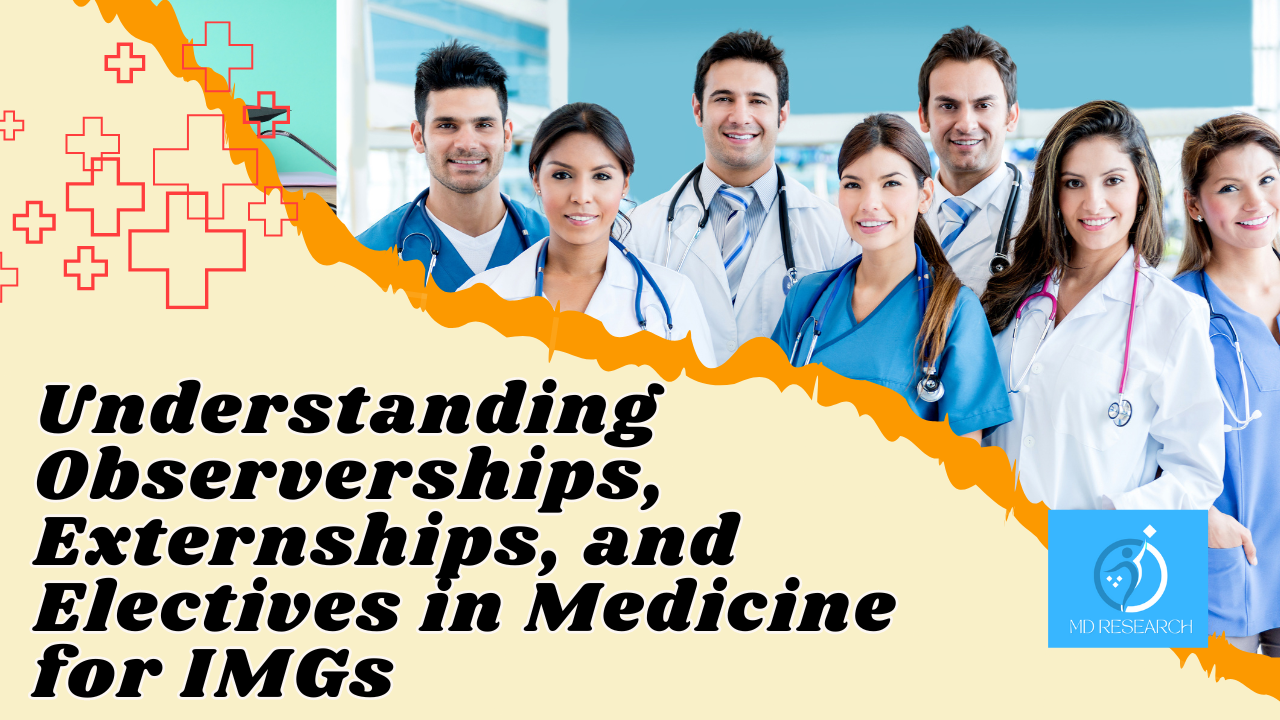Understanding Observerships, Externships, and Electives in Medicine for IMGs

For International Medical Graduates (IMGs) preparing for the USMLE journey and aiming for residency spots in the United States, gaining clinical experience in the U.S. healthcare system is crucial. This article delves into the different types of clinical experiences available: observerships, externships, and electives, their significance, and which one you should prefer.
Electives
Timing and Eligibility:
Electives are clinical rotations undertaken before receiving your final medical degree, typically during the internship period.
Advantages:
– Hands-on Experience: Electives offer hands-on clinical experience in the U.S., which is highly valued by many residency programs.
– Increased Match Chances: Performing well during an elective can significantly enhance your chances of matching into that program, provided you meet their criteria.
– Networking and Recommendations: Electives provide an opportunity to build relationships with U.S. faculty, which can lead to strong letters of recommendation.
Observerships
Timing and Eligibility:
Observerships are done after obtaining your final medical degree. They provide a significant U.S. Clinical Experience (USCE).
Types and Approaches:
– Paid vs. Free: Observerships can be either paid or free. Free observerships often require finding the right faculty who are willing to allow shadowing.
– Hospital-Based Preferred: Hospital-based experiences are generally preferred over clinic-based ones.
– Networking: Successfully securing a free observership might involve sending numerous emails to physicians or requesting meetings in person.
Significance:
– Understanding U.S. Healthcare System: Observerships allow IMGs to familiarize themselves with the U.S. healthcare system and observe clinical practices.
– Skill Enhancement: Although primarily observation-based, some observerships may include hands-on training after basic serology tests and with necessary qualifications and registrations.
Externships
Timing and Eligibility:
Externships are similar to observerships but typically involve more hands-on experience. They are usually done after graduation.
Advantages:
– Hands-on Experience: Externships provide hands-on clinical experience similar to electives but are available post-graduation.
– USCE: Like observerships, externships count as USCE and can enhance your residency application.
Internships
Context at Tata Medical Center:
Internships at Tata Medical Center are short-term, unpaid positions available to students and graduates looking to gain skills and experience in specific professional fields. They require a no-objection certificate from the institution where the intern is currently studying or affiliated.
Departments for Internships:
- – Customer Care/Operations/Patient Services
- – Human Resources
- – Quality
- – Bio Medical
- – Medical Records
- – Nursing
- – Clinical Services (specific specialties)
- – Diagnostic Services
- – Paramedical Services
Which to Prefer?
Electives:
– When to Choose: If you are still a medical student and have the option to do electives, this should be your first choice. Electives provide direct clinical exposure and the chance to impress potential residency programs.
– Benefits: Hands-on experience, potential for strong recommendations, and better understanding of the U.S. healthcare system.
Observerships:
– When to Choose: If you have already graduated and are looking to gain U.S. clinical experience, observerships are a viable option.
– Benefits: Exposure to the U.S. healthcare environment, networking opportunities, and can be a stepping stone to hands-on externships.
Externships:
– When to Choose: If you need hands-on clinical experience post-graduation, externships are ideal.
– Benefits: Direct clinical involvement, which is highly regarded in residency applications.
Conclusion
For IMGs on their USMLE journey, choosing the right type of clinical experience can significantly impact their residency applications. Electives, observerships, and externships each offer unique benefits and opportunities. Electives are preferable if you are still a student, while observerships and externships are valuable for graduates seeking U.S. clinical experience. Hospital-based experiences are generally more advantageous than clinic-based ones. Ultimately, the choice depends on your current status and specific goals, but all these experiences collectively contribute to a stronger residency application.
